No. 12, Vol. 2. Vernal Equinox 2007

The Little Book of Black Venus
attributed to John Dee
translated by
Teresa Burns and Nancy Turner
This translation was made primarily from London’s Warburg Institute Ms. FBH 51 (written about 1600, +/- 20 years), following the comparison made by Jörg M. Meier between that handwritten manuscript and eight others,[1] especially Munich’s Bayerische Staatsbibliothek, Cod. lat. 27005 (17th century), Erlanger’s Universitätsbibliothek Erlangen-Nürnberg Ms. 854 (second half of the 17th century), and the 1794 Gedrucker text from Vienna. Except as noted, we’ve followed the Warburg copy except to regularize spelling or grammar (i.e., when it says “pargamento” (parchment), we’ve used the more typical spelling “pergamento”). Where no manuscript follows usual spelling or grammar we’ve used the Warburg manuscript, and we’ve also followed Meier’s transcription of capitalization and inter-paginal line breaks from that version.
Our frontispiece matches the general color scheme of the Warburg manuscript. With the exception of the frontispiece, we’ve used black and white text and graphics throughout because of the irregularity between manuscripts (for instance, the Munich manuscript’s frontispiece presents a Venus with green hair and a red hexagram.)[2] The Warburg manuscript writing appears dark brown, while its most colorful counterpart, the Munich manuscript, intersperses greens and reds throughout the black text: for instance, in the title, first four lines, and sub-title, this multi-colored version renders Libellus, in Astris, TUBA, Dæmon, and TUBA in red, and VENERI, VENUS, STYGIUS, and SIGN in green.[3] Given that even the Warburg manuscript is most likely not Dee’s handwriting, and the Munich version is a copy from later still, we found it most appropriate to leave the choice of colors to the reader’s magical or aesthetic understanding and keep our writing and graphics in black and white. Thank you to Darlene for providing the cover art, and J.S. Kupperman for recreating the manuscript’s many line drawings.
~~~~~~~~~~~~~~~~~~~~
LIBELLUS VENERI NIGRO[4] SACER
The Consecrated Little Book of Black Venus

| Est VENUS a Superis mihi datum nomen in
Astris |
She is VENUS on High, a name given to me by the Stars. |
TUBA VENERIS id est |
The Horn of Venus That is |
| Vocatus sive Citationes Sex Spirituum sub Veneris dominio existentium, ubi docetur Methodus perficiendi Sigillum Veneris Eiusque Tubam, Circuli, Compositio, Nomina propria Spirituum, Eorum Vocatus et Sigilla cum horum præparatione. Libri consecratio, Operationis Ritus. Spirituum Valedictio cum aliis adhuc pluribus in opere observandis. | The Calls[10] or the Summonings of the Six Spirits ruled by Venus, whereby the Method is taught to create the Seal,[11] Horn, and Circle of Venus, their Arrangement, the proper Names of her Spirits, Their Calls and Seals with hours for preparation. The consecration of the Book, the Rite of the Working. The Dismissal of the Spirit with still other things to be observed during the working. |
Joannes Dee Amatoribus Artis Magicæ S.P.D. |
John Dee greets the Lovers of the Art of Magic |
Non de variis Negromanticæ Artis vel definitionibus
vel Speciebus vel etiam multifaria ejusdem praxi hic scribendi nostra
intentio Scopusque Libelli nostri est, quippe quam plurimi de his
quam plurima pauci tamen pauca clara ac vera quin potius tum captu
tum praxi difficillima scripsere volumina. Sed Tuba hic tibi canimus
Amice Lector! per cujus Sonum Sex Veneris Dominio subjecti Spiritum
ad choreas excitantur citantur ad normam et modum à me ipso
prout edoctus sum sæpe sæpius exercitatum. Citanti enim
tibi Dæmones ante omnia Vocatus Spiritui cuivis proprius necesse
est. Secus haud quaquam comparebunt quamvis eos per fortes conjurationes
ceu efficacia vincula cogi posse non negaverim non tamen sine ingenti
labore aut circumstantiis prolixis amplivaguis et difficillimis. Si
vero hujus Vocatus, id est nominum ac citationum seu vocabulorum propriorum,
quibus Spiritus ab ipsis Planetarum Angelis advocantur imperantur
tibi notitia est nec requisitis reliquis in hoc Libello nostro assignatis
carueris mox et sine mora strepitu terrore ac phantasmate omni longe
remoto citatos â te Spiritum in forma humana comparere coactos
experieris. Scire enim te oportet bonos â Deo teropt. Max. malis
præpositos esse Spiritibus ut in illos dominentur; qua propter
si â Spiritu bono malo alicui præcipietur quidquam hunc
ille competenti suo vocatu vocat jubetque, licet forte in lingua mortalibus
nobis haud propria quin imo incognita. Inter Doctores variæ
quidem de ea opinionem certitudo autem hactenus nulla. Verum enim
vero Creator omnium maximus omni creaturæ certum imposuit Characterem
nomenque utpote qui numerat multitudinem Stellarum et omnibus eis
nomina vocat.  al.CXLVI. Omnes autem
mali Dæmones, quum Angeli Stellæque antecedenter fuerint
in coelis, nomina Signaque illis â Summo creatore imposita adhuc
dum retinent atque per hæc ipsissima illos citare et compellere
omnino necessarium est, quo modo etiam bonos Angelos advocare possumus,
prout alibi docui et demonstravi. Scientiam hanc praefatam ab antiquis
Patribum Israëliticis Chaldeis aliisque pluribus pie exercitatam
ac hodiedum â piis hominibus practicandam. Exinde enim revelatæ
sunt Scientiæ: Magia, Qabala et Negromantia, quæ posterior
apud Egyptos, Persas et Arabes non parum floruit, licet execrandum
in modum usurpata, depravata lacerata, hominibus per Sacrilega pacta
in Dæmoniorum malorum mancipia se se sponte tradentibum quod
certe horrendum auditu est. Propter pessimum igitur hunc abusum ab
Ecclesia et Secularibus Magistratibus hæc Ars piè est
interdicta atque ideo paucissimos idoneos de ejus praxi libros reperire
fas est. Tubam ergo hancce noctram studio peculiari adeptam fideliter
tibi in bonum tamen finem nequaquam autem in tuum interitum (qui ex
soli abusione nanciscitur) communicatam legatamque volumus ut pro
bono tui ea utaris et commodo v:g: ad levandos thesauros absconditos
ad itinera ad Mercaturam ad Navigationem ad bellum et similia ad quæ
Spiritus prodesse tibi et inservire possunt uti. Praxis et experientia
satis docebit. Dantur ceteroquin alii adhuc vocatus seu citationes
Spirituum quæ fiunt per supremos illorum Principes inter semet
ipsos habentes sed hi valde difficulter obediunt haud aliter quam
cum ingenti strepitu et in forma maxime terribili comparentes non
sine ingenti Operatoris periculo. Hic noster proinde Vocatus Spirituum
de quo scripturi sumus Veneri proprius est et ideo à nobis
Tuba Veneris nuncupatur siquidem mali Dæmones Septem Planetarum
Angelis vix non omnes sunt subjecti qui autem huic inserti sunt Libello
sub Veneris duntaxat computantur Dominio ex quo capite Libellus Veneris
â nobis fuit intitulatus quin etiam isti Planetæ consecrandus
est ad cujus descriptionem jam initium facimus teque ad cuncta diligenter
auscultare et attendere monemus. Vale! al.CXLVI. Omnes autem
mali Dæmones, quum Angeli Stellæque antecedenter fuerint
in coelis, nomina Signaque illis â Summo creatore imposita adhuc
dum retinent atque per hæc ipsissima illos citare et compellere
omnino necessarium est, quo modo etiam bonos Angelos advocare possumus,
prout alibi docui et demonstravi. Scientiam hanc praefatam ab antiquis
Patribum Israëliticis Chaldeis aliisque pluribus pie exercitatam
ac hodiedum â piis hominibus practicandam. Exinde enim revelatæ
sunt Scientiæ: Magia, Qabala et Negromantia, quæ posterior
apud Egyptos, Persas et Arabes non parum floruit, licet execrandum
in modum usurpata, depravata lacerata, hominibus per Sacrilega pacta
in Dæmoniorum malorum mancipia se se sponte tradentibum quod
certe horrendum auditu est. Propter pessimum igitur hunc abusum ab
Ecclesia et Secularibus Magistratibus hæc Ars piè est
interdicta atque ideo paucissimos idoneos de ejus praxi libros reperire
fas est. Tubam ergo hancce noctram studio peculiari adeptam fideliter
tibi in bonum tamen finem nequaquam autem in tuum interitum (qui ex
soli abusione nanciscitur) communicatam legatamque volumus ut pro
bono tui ea utaris et commodo v:g: ad levandos thesauros absconditos
ad itinera ad Mercaturam ad Navigationem ad bellum et similia ad quæ
Spiritus prodesse tibi et inservire possunt uti. Praxis et experientia
satis docebit. Dantur ceteroquin alii adhuc vocatus seu citationes
Spirituum quæ fiunt per supremos illorum Principes inter semet
ipsos habentes sed hi valde difficulter obediunt haud aliter quam
cum ingenti strepitu et in forma maxime terribili comparentes non
sine ingenti Operatoris periculo. Hic noster proinde Vocatus Spirituum
de quo scripturi sumus Veneri proprius est et ideo à nobis
Tuba Veneris nuncupatur siquidem mali Dæmones Septem Planetarum
Angelis vix non omnes sunt subjecti qui autem huic inserti sunt Libello
sub Veneris duntaxat computantur Dominio ex quo capite Libellus Veneris
â nobis fuit intitulatus quin etiam isti Planetæ consecrandus
est ad cujus descriptionem jam initium facimus teque ad cuncta diligenter
auscultare et attendere monemus. Vale! |
It is not our intention or the goal of our little book to write about the different Negromantic[12] Arts, their definitions, subdivisions, methods or even their various practices of which Views and Books many have already written about. Of these difficult volumes, only a few are clear and true, at one moment for the understanding, the next moment for the actual practice. Here however we sound a Horn for you, Beloved Reader! through whose Sound Six Spirits ruled by Venus will be called to come here and dance, using a method that I myself have practiced several times. In order to call the Dæmons, you must Call the Spirits with the proper name of each. Although I do not wish to disagree that they can be forced to come by means of powerful conjurings or strong chains, but not without great effort and plentiful, long-winded, and difficult circumstances. If you are familiar with this Call, that is, the names and special words with which the Spirits are called and ordered by the Planetary Angels themselves, and if you adhere to the other necessities that are shown in our little Book, and if you have pushed away all phantasmagoric figures, you will perceive that soon and without hesitation, noise, or terrors, the Spirits that you have called will be forced to appear before you in human form. You should know that the good angels of God, the best and most High, are placed above evil spirits so they can rule them; therefore whenever an evil spirit must be ordered to do something, the good spirit calls and orders the evil one with his appropriate call, but he does so with a language that is not typical and is indeed unknown to us mortals. Among the Learned there are indeed different opinions, and at this time no certainty. It is certain, however, that the highest Creator gave all created things a distinct Sign and name, since it is written: “He determines the number of the stars; he gives to all of them their names.” Psalm 146.[13] Because they were once Angels and Stars in the heavens, all evil Dæmons still have the names and Signs that were given to them by the Great Creator, and therefore it is necessary to call and force them by using the same means by which we can also call the good Angels, as I have shown and taught in other places. This aforementioned Science was practiced in antiquity by the Israelite Patriarchs, the Chaldeans, and many others, and pious people of today still practice it. Therefore these Sciences are revealed: Magic, Kabbala, and Negromancy, which last flourished not a little among the Egyptians, Persians and Arabs, even if it was in an unlawful, distorted and mutilated form, since humans voluntarily delivered themselves into the possession of the evil Dæmons through pacts of Sacrilege, which is certainly horrible to hear.Due to this most shameful misuse, this Art was rightfully forbidden by the Church and Lay Authorities and because of this one finds very few books suited to this practice. Therefore, after we convey and hand over to you our Horn, which we attained with extraordinary trouble, for a good purpose, and under no circumstances to bring about your destruction (for this occurs only when misused), we want to leave it for your use, e.g. for lifting hidden treasures, for Navigating, Trade, war, and other ways likewise where the Spirit can be of service to you. Practice and experience will teach a lot. There are, moreover, still other calls or summonings of Spirits, who appear by means of their highest Princes who exist among them, but it is very hard to get them to obey, and they appear only with immense noise and racket in an extremely terrible form and not without the highest danger for the Operator. Our Call of the Spirits, about which we will write, belongs to Venus and therefore we call it the Horn of Venus. Not all evil Dæmons are ruled by the Seven Planetary Angels; however, those written about in this book, are counted among those under the rule of Venus, which is why we title it above “The Book of Venus,” since it is also dedicated and consecrated to that Planet whose description we now begin, and we admonish you to listen very carefully and pay close attention. Farewell! |
Perfectum Scriptumque Londini Anno MDLXXX. Pridie Nonis Junij. |
Completed and written in London in the year
1580, on the 4th of June. |
Tubæ Veneris Caput primum Quomoda Sigillum sive Character Veneris pediciendum |
The Horn of Venus Chapter One How the Seal or Sign of Venus is to made |
Primum ad Negromanticam hanc operationem nostram requisitum
Sigillum Veneris est quod modo sequenti præparandum. Accipiatur
Pars æris Cyprii novi et nunquam usati perficiatur ex eo in
magnitudine figuræ paulo post delineatæ Lamina quæ
scindi debet secundum Planetæ numerum sibi proprium, id est
in sex Angulos: cui deinde instrumento ferreo vel chalybeo nova pariter
et munda Character insculpatur fiat autem hoc in die  de nocte in tertia et decima hora â
de nocte in tertia et decima hora â |
The first thing we need for our Negromantic work is the Seal of Venus, which
is to be made in the following way: One takes a Piece of new Copper
ore and from it makes a Plate the size of the figure drawn below;[14]
one must cut this [Plate] according to the number appropriate for
the Planets, that is, with six Angles: the Character should be engraved
using a new and pure iron or steel instrument on the day |
Fumigium fiat em Speciebus: Verbena Puscia et Musco. |
Let the Consecration be done with these Materials: Verbane, Myrtle, and Musk. |
| Involvatur postea in lintheum novum atque iterum in tempore prædicto
Novilunii diei horæque noctu defodiatur in terram penes aquam
fluentem effodiatur in subsequenti die et hora |
Afterwards one wraps it in new linen and buries it likewise at the
aforementioned time of the day of the New Moon, at night next to a
flowing body of water, then unburies it on the following night at
the hour of |
Sigillum Veneris
[The Seal of Venus]
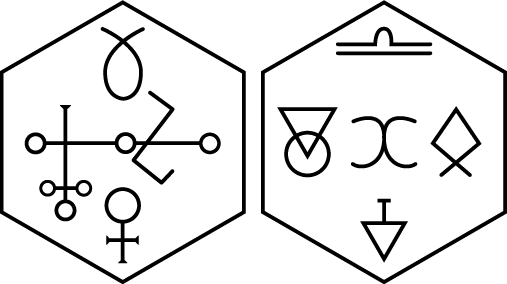
Caput Secundum. Quomodo Tuba Veneris sit præparanda. |
Chapter Two : How to Make the Horn of Venus |
| Accipiatur Cornu em Tauro vivo dein sumatur Vitriolum
in aceto vineo liquefactum cum quo abluatur purgaturque Cornu, quo
facto prædicto Instrumento Chalybeo cuivis parti insculpantur
Characteres uti in mox sequenti adumbratione extant. Tota autem hæc
prædicta Cornu præparatio incluso tempore in quo id ex
tauro abripitur, pari ratione ac de Sigillo antecedenter indicatum
est in temporibus diebus et horis |
One takes the Horn[15]
of a living Bull, then one takes Vitriol dissolved in vinegar, with
which one should wash and purify the Horn, after which one carves
the Characters as they are represented in the following sketch, into
either side of the horn with the aforementioned Steel Instruments.
One must make sure that the entire preparation of the Horn, including
the time it is torn off from the bull, must also be in the times,
days and hours of |
Tuba Veneris
[The Horn of Venus]
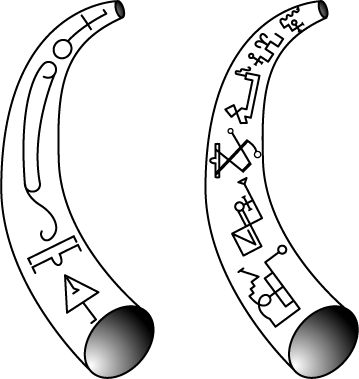
Caput Tertium Quomodo Circulus faciendus |
Chapter Three: How to Make the Circle |
| Antequam ad Spirituum Vocatum seu citationem progrediamur
de circuli compositione nobis agendum erit, utpote quo Negromantici
omnes in suis semper utantur operationibus per hunc tanquam per fortissimum
munimentum contra Dæmonum insidiationes sese tuentes. Compositio
autem circulorum multifaria est, aliqui operantes in ædibus
eundem perficiunt crete carbonibus et coloribus; nonnulli in sylvis
vel biviis exorzisantes faciunt gldio vel certis baculis; Alii vero
conficiunt circulum ex pergamento cum inscriptione Divinorum nominum,
quem et nos ad nostram operationem elegimus, prout etiam fortunatiori
hæredi cum cæteris requisitis omnibus jamjam confectum
reliquimus, nec non formam ejus et rationem pro libelli nostri ordine
et integritate hic adjungimus. Accipiatur ergo pergamentum sive charta
virginea, scindantur ex eo in latitudine pollicari tres circuli. primus
in amplitudine sex pedum reliqui duobus vel tribus digitis angustius,
postmodum in præfixis temporibus horisque |
Before we talk about how to Call or to Spirit, we must
address the arrangement of the circle, from which the Negromancer
sets in order everything to be used for the working, in order to protect
himself by means of the strongest defenses against the attacks of
Dæmons. Different people create the circle various ways. Some,
who work in closed buildings, prepare it with chalk, coal or colors.
Some, who conjure in forests or at crossroads, create it with a sword
or certain staffs; others, however, create the circle out of a parchment
upon which the Divine names are inscribed, which is the method which
we have chosen for our work, since we have bequeathed the circle to
a more fortunate inheritance with all the rest of the objects that
have already been made, and we add only the form and method here to
our book to order it and to make it whole. One takes thus some parchment
or virgin paper, and cuts from this a latitude for three circles,
the first [circle] six feet in diameter; the remaining circles two
or three fingers in from the first. Soon thereafter the divine Names
should be written in color during the prescribed times and hours of
|
Forma Circuli
[Shape of the circle]
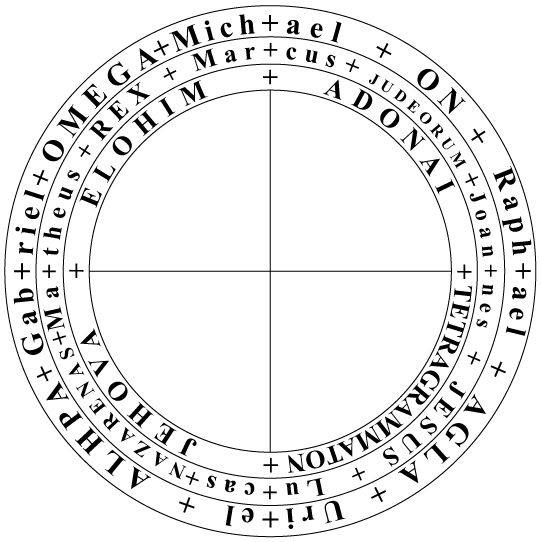
Caput Quartum Vocatus Spirituum eorum nomina propris horumque signa quomodo sint facienda. |
Chapter Four How to Call the Spirits, and how to create their special names and signs. |
Nomen primi Spiritus. Mogarip. Sigillum.
[The name of the first Spirit: Mogarip. The Seal.]
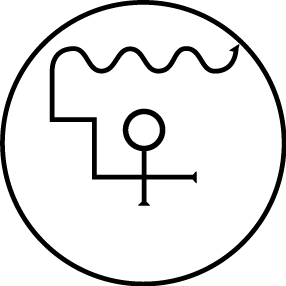
| Vocatus: Mogarip! Mogarip! Mogarip! Hamka Temach Algazoth Syrath Amilgos Murzocka Imgat Alaja Amgustaroth Horim Suhaja Mogarip! Mogarip! Mogarip! |
The Call: Mogarip! Mogarip! Mogarip! Hamka Temach Algazoth Syrath Amilgos Murzocka Imgat Alaja Amgustaroth Horim Suhaja Mogarip! Mogarip! Mogarip! |
Nomen secundi Spiritus. Amabosar. Sigillum.
[The name of the second Spirit: Amabosar. The Seal.]
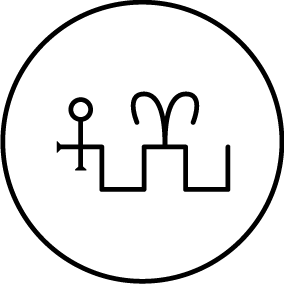
| Vocatus: Amabosar! Amabosar! Amabosar! Pharynthos Egayroth Melustaton Castotis Mugos Nachrim Amabosar! Amabosar! Amabosar! |
The Call: Amabosar! Amabosar! Amabosar! Pharynthos Egayroth Melustaton Castotis Mugos Nachrim Amabosar! Amabosar! Amabosar! |
Nomen Tertij Spiritus. Alkyzub. Sigillum.
[The name of the third Spirit: Alkyzub. The Seal.]
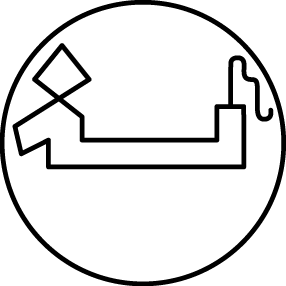
| Vocatus: Alkyzub! Alkyzub! Alkyzub! Mergastos Hajagit Agaschar Asmodit Burgum Zephar Largon Cherip Galgadim Uriach Alkyzub! Alkyzub! Alkyzub! |
The Call: Alkyzub! Alkyzub! Alkyzub! Mergastos Hajagit Agaschar Asmodit Burgum Zephar Largon Cherip Galgadim Uriach Alkyzub! Alkyzub! Alkyzub! |
Nomen Quarti Spiritus. Belzazel. Sigillum.
[The Name of the Fourth Spirit: Belzazel. The Seal.]
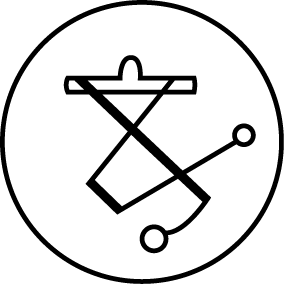
| Vocatus: Belzazel! Belzazel! Belzazel! Thittersa Zapkyos Brusiat Algior Soryam Ferozim Abdizoth Mulosin Belzazel! Belzazel! Belzazel! |
The Call: Belzazel! Belzazel! Belzazel! Thittersa Zapkyos Brusiat Algior Soryam Ferozim Abdizoth Mulosin Belzazel! Belzazel! Belzazel! |
Nomen Quinti Spiritus: Falkaroth. Sigillum.
[The Name of the Fifth Spirit: Falkaroth. The Seal.]
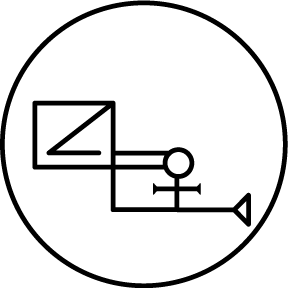
| Vocatus: Falkaroth! Falkaroth! Falkaroth! Hymelion Lothaia Estachar Indos Nomirim Hamach Felogon Morgoseos Angar Arastus Falkaroth! Farkaroth! Farkaroth! |
The Call: Falkaroth! Falkaroth! Falkaroth! Hymelion Lothaia Estachar Indos Nomirim Hamach Felogon Morgoseos Angar Arastus Falkaroth! Farkaroth! Farkaroth! |
Nomen Sexti Spiritus: Mephgazub. Sigillum.
[The Name of the Sixth Spirit: Mephgazub. The Seal.]
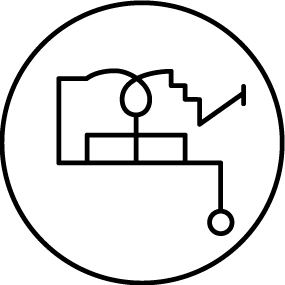
| Vocatus: Mephgazub! Mephgazub! Mephgazub! Samanthros Jaramtin Algaphonteos Zapgaton Osachfat Mergaim Hugal Zerastan Alcasatti Mephgazub! Mephgazub! Mephgazub! |
The Call: Mephgazub! Mephgazub! Mephgazub! Samanthros Jaramtin Algaphonteos Zapgaton Osachfat Mergaim Hugal Zerastan Alcasatti Mephgazub! Mephgazub! Mephgazub! |
Quomodo hæc Sigilla Spirituum sint
facienda |
How to make the Seals of the Spirits |
| Accipiatur Cera viridis cui misceatur de fuligine,
fiant ex ea assulæ rotundæ inseranturque in eas instrumento
chalybeo Sigillum hujusce Spiritus qui citari intenditur. fiant hæc
sicut cætera antedicta simili ratione in tempore die et hora
|
One takes green Wax, to which one mixes soot, makes from this round
pieces and, with steel instruments, cuts into them the Seal of that
Spirit one wishes to invoke. Let these Seals be consecrated with smoke
in the same way as the others aforementioned in the time, by the day
and in the hour of |
Quomodo Libellus iste sit consecrandus. |
How to consecrate the Book |
| Libellus (cui Spirituum nomina et Vocatus inscripti sunt) antecedenter
consecretur necesse est: uti nimirum antiqui fecerunt Magi qui similium
librorum consecrationem ita instituere ut apperiendo duntaxat librum
spiritus max comparere coëgissent, quod tamen nobis nimium videtur
periculosum præsertim si talis liber infortuite in manus hominum
hanc artem penitus ignorantium incidat. Quare libellum nostrum sequenti
consecrare libuit modo. Fiat Libellus ex Pergamento cui imprimis insignatur
Character |
It is necessary to consecrate the Book (in which the
names and Calls of the Spirits are written) before using it, just
as the old Magi did, whose consecrations forced spirits to appear
in similar books; however, for us this practice is all too dangerous,
particularly if such a book infortuitously fell into the hands of
people completely unacquainted in this art. Therefore we prefer to
consecrate our book the following way: Let the Book be made from Parchment,
with the symbol of |
Libellus Veneri nigræ Sacer. |
The Consecrated Book of the dark Venus[17] |
| Ante Vocatum Spirituum scribatur in Rubrica Tuba Veneris ad Normam hujus nostri Libelli, qui â me ipso consecratus atque cum reliquis omnibus appertinentiis posteritati relictus est, si secus fortuna hæc omnia tibi ad manus decreverit. Integer proinde libellus in sæpe dictis temporibus conscribi debet ad quod ulterius requiritur penna ex columba atque attramentum calcanto compositum et a nemine usatum etiam viridi rubeoque colore pro libitu uti potest, nam hi colores Planetæ nostro omnino grati sunt. Libellus postquam compositus et conscriptus est infumicetur. dein accipiatur aqua Vitrioli cum qua manus impleatur et liber bapticetur dicendo. | Before the Call of the Spirits one should write “The Horn of Venus” in Red, as is Standard in our Book, which was consecrated by me myself and that will be left for future generations with all of the rest of the things that belong to it, just as fate has put all of this into your hands. This book must be written therefore completely in the times of Venus often mentioned already, with the feather of a dove, copper vitriol water, and virgin ink. Green and red can be used as desired, because Venus welcomes these colors. After the book is produced and written, one envelopes it with smoke. Then, taking the Vitriol water, one fills the hand and baptizes the book by saying: |
| Veneri nigrum te Sacro libellum Veneris esto Tuba tibi nomen incolis tremena que sitque bene notum |
To dark Venus I consecrate you, Sacred Book. |
| O Magne Princeps Anaël Olympi! Te rogo supplex robora Volumentuo qui perenni semper honori |
Oh Anael, Great Olympic Prince! I ask you humbly, strengthen this Volume, Washed in your spring to eternal honor. |
| Veneris horis Dæmon ut inscriptus advolet velox hæc si Tuba cantat qua volo præstet, faciat invitus. |
May the Dæmon inscribed within it Come quickly in the hours of Venus, If this Horn sounds And carry out what I want, even if he is unwilling. |
Hoc facto rursum Libellus infumetur atque in pannum vel viridum vel rubrum involvetur, subdatur supter terram cum cæteris rebus et in tempore præscripto effodiatur et pro usu conservetur. | As soon as this is done, one should once again envelop the Book in smoke and wrap it in a green or red cloth, and then bury it with the rest of the things under the earth and at the time prescribed before, unbury it, and store it for use. |
Quomodo operatio instituenda sit |
How to undertake the working |
| Si omnia hæc antedicta tandem rite præparata
promptaque ad manus fuerint atque operator se se ipsum satis probaverit
præparaveritque idoneum et animosum (pro uti id imperterritum
magnanimumque omnino desiderat virum) accedat in eodem sæepe
indicato tempore hora et nocte |
When all of these aforementioned things are finally properly prepared
and ready and the operator deems himself suitable and brave enough
and has prepared himself (since this requires an absolutely unfrightened
and courageous man), he should go during the same oft-mentioned time,
hour, and night of |
| Advenientem Spiritum salutet modo sequenti: | He should Greet the Spirit in this way: |
| Salve nobilis ac obediens Spiritus (nominetur hic Spiritus suo nominee). Impero tibi per tremendum nomen Adonai et per hoc Sigillum (:monstret Spiritui Sigillum:) Angeli Anaëlis Principis Regentis Planetæ Veneris ut quietem te exhibeas et tranquillum atque in omnibus quæ tibi mandaturus sum voluntatem meam adimpleas. Hoc tibi iterato præcipio per Deum Patrem Filium et Spiritum Sanctum et per Triumphatorem Dominum Jesum Christum qui venturus est judicare seculum per ignem. | “Hail to you, noble and obedient Spirit (here one addresses the Spirit by its name). I order you, in the powerful name of Adonai and with this Seal (show the Spirit’s Seal) of the Angel Anael, the Supreme Regent of the Planet Venus, to calmly and peacefully behave and fulfill my will in all things that I instruct you to do. This I command you moreover by God the Father, the Son, and the Holy Ghost, and by the Triumphant Lord Jesus Christ, who will come to judge the world through fire.” |
| Post hæc Spiritus Magistrum interragobit quare
fuerit citatus, quidnam præcipiat? et desideret atque hoc Magister
clare et distincte denominet. ubi notandum quad si Spiritum in aliquibus
pertinaces sese ostenderent, accipiatur Sigillum |
After this the Spirit will ask the Master why he has been summoned and what the master wishes and commands. And this the Master should then clearly and distinctly state. If the spirit shows himself in any way to be uncooperative, one must be sure to take the Seal of Venus and place it over the fire or coal with which the censer was made, or if one is not using a censer (since using one is not absolutely necessary), one may hold the Seal over a burning candle so that it becomes warm and then place it upon the summoned spirit. When one does this, spirits are terribly pained and they beg the master to stop tormenting them and they become no longer resistant to fulfilling his will. Surely I advise that the Master not overstep the mark too much with his demands and wishes and in so doing provoke Divine wrath, nor vacillate and show himself inconstant to the sly spirits, or even worse, accept conditions that they suggest to him. But rather, with a brave and firm mind, he should insist upon the requests he has expressed to the Spirits and he should regard their threats and protestations of feigned difficulties to be empty nothings, otherwise he will lose his Rule over these Spirits. No less must one guard himself from using the help of Spirits to carry out godless and criminal deeds which the Spirits will show themselves even more eager to do: indeed, the soul would certainly suffer the greatest damage [if it behaved so] since while he considers himself to be exerting his power over the demons, he would actually be delivering his soul into the terrible servitude of the demons. Therefore we sincerely advise once more against all and every single misuse of this art. When the Spirits have fulfilled the commands or will of the Master, they should be dismissed in the following way: |
Valedictio Spirituum. |
The Dismissal of the Spirit. |
| Hæc fit sicut Vocatus per Tubam |
Speaking as before through the Horn of |
| His auditis Spiritum mox fient invisibiles et magistro facta pro libitu benedictione e Circulo egredi est licitum. | When they have heard these words, the Spirits will immediately become invisible, and the master may leave the Circle after he has spoken whatever benediction he wants. |
Quæ ulterius adhuo in operatione observanda
sunt. |
Other things that should be paid attention
to during the work. |
| Si cum sociis fiat experimentum Ille tantum unicus
loquatur Spiritibus, qui Magistrum agit, et illos advocat, reliqui
omnes silentium observent. Quod si Spiritus ad adferendum Thesauros
et nummos compellantur sic pecuniis vel Thesauro imponi debet, Sigillum
|
If the experiment is carried out with other people present, only
one person, who acts as Master and does the Calls, should speak with
the Spirits. All others should remain silent. If the Spirits are forced
to bring treasures or coins, one must place the Seal of |